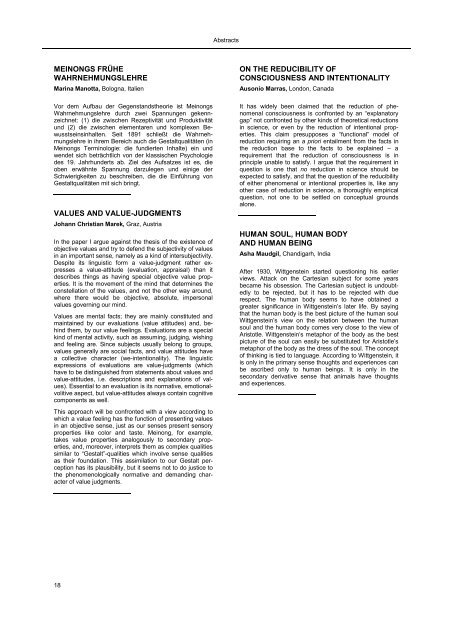Erfahrung und Analyse Experience and Analysis - Austrian Ludwig ...
Erfahrung und Analyse Experience and Analysis - Austrian Ludwig ...
Erfahrung und Analyse Experience and Analysis - Austrian Ludwig ...
You also want an ePaper? Increase the reach of your titles
YUMPU automatically turns print PDFs into web optimized ePapers that Google loves.
MEINONGS FRÜHE<br />
WAHRNEHMUNGSLEHRE<br />
Marina Manotta, Bologna, Italien<br />
Vor dem Aufbau der Gegenst<strong>and</strong>stheorie ist Meinongs<br />
Wahrnehmungslehre durch zwei Spannungen gekennzeichnet:<br />
(1) die zwischen Rezeptivität <strong>und</strong> Produktivität<br />
<strong>und</strong> (2) die zwischen elementaren <strong>und</strong> komplexen Bewusstseinsinhalten.<br />
Seit 1891 schließt die Wahrnehmungslehre<br />
in ihrem Bereich auch die Gestaltqualitäten (in<br />
Meinongs Terminologie: die f<strong>und</strong>ierten Inhalte) ein <strong>und</strong><br />
wendet sich beträchtlich von der klassischen Psychologie<br />
des 19. Jahrh<strong>und</strong>erts ab. Ziel des Aufsatzes ist es, die<br />
oben erwähnte Spannung darzulegen <strong>und</strong> einige der<br />
Schwierigkeiten zu beschreiben, die die Einführung von<br />
Gestaltqualitäten mit sich bringt.<br />
VALUES AND VALUE-JUDGMENTS<br />
Johann Christian Marek, Graz, Austria<br />
In the paper I argue against the thesis of the existence of<br />
objective values <strong>and</strong> try to defend the subjectivity of values<br />
in an important sense, namely as a kind of intersubjectivity.<br />
Despite its linguistic form a value-judgment rather expresses<br />
a value-attitude (evaluation, appraisal) than it<br />
describes things as having special objective value properties.<br />
It is the movement of the mind that determines the<br />
constellation of the values, <strong>and</strong> not the other way aro<strong>und</strong>,<br />
where there would be objective, absolute, impersonal<br />
values governing our mind.<br />
Values are mental facts; they are mainly constituted <strong>and</strong><br />
maintained by our evaluations (value attitudes) <strong>and</strong>, behind<br />
them, by our value feelings. Evaluations are a special<br />
kind of mental activity, such as assuming, judging, wishing<br />
<strong>and</strong> feeling are. Since subjects usually belong to groups,<br />
values generally are social facts, <strong>and</strong> value attitudes have<br />
a collective character (we-intentionality). The linguistic<br />
expressions of evaluations are value-judgments (which<br />
have to be distinguished from statements about values <strong>and</strong><br />
value-attitudes, i.e. descriptions <strong>and</strong> explanations of values).<br />
Essential to an evaluation is its normative, emotionalvolitive<br />
aspect, but value-attitudes always contain cognitive<br />
components as well.<br />
This approach will be confronted with a view according to<br />
which a value feeling has the function of presenting values<br />
in an objective sense, just as our senses present sensory<br />
properties like color <strong>and</strong> taste. Meinong, for example,<br />
takes value properties analogously to secondary properties,<br />
<strong>and</strong>, moreover, interprets them as complex qualities<br />
similar to “Gestalt”-qualities which involve sense qualities<br />
as their fo<strong>und</strong>ation. This assimilation to our Gestalt perception<br />
has its plausibility, but it seems not to do justice to<br />
the phenomenologically normative <strong>and</strong> dem<strong>and</strong>ing character<br />
of value judgments.<br />
18<br />
Abstracts<br />
ON THE REDUCIBILITY OF<br />
CONSCIOUSNESS AND INTENTIONALITY<br />
Ausonio Marras, London, Canada<br />
It has widely been claimed that the reduction of phenomenal<br />
consciousness is confronted by an “explanatory<br />
gap” not confronted by other kinds of theoretical reductions<br />
in science, or even by the reduction of intentional properties.<br />
This claim presupposes a “functional” model of<br />
reduction requiring an a priori entailment from the facts in<br />
the reduction base to the facts to be explained – a<br />
requirement that the reduction of consciousness is in<br />
principle unable to satisfy. I argue that the requirement in<br />
question is one that no reduction in science should be<br />
expected to satisfy, <strong>and</strong> that the question of the reducibility<br />
of either phenomenal or intentional properties is, like any<br />
other case of reduction in science, a thoroughly empirical<br />
question, not one to be settled on conceptual gro<strong>und</strong>s<br />
alone.<br />
HUMAN SOUL, HUMAN BODY<br />
AND HUMAN BEING<br />
Asha Maudgil, Ch<strong>and</strong>igarh, India<br />
After 1930, Wittgenstein started questioning his earlier<br />
views. Attack on the Cartesian subject for some years<br />
became his obsession. The Cartesian subject is <strong>und</strong>oubtedly<br />
to be rejected, but it has to be rejected with due<br />
respect. The human body seems to have obtained a<br />
greater significance in Wittgenstein’s later life. By saying<br />
that the human body is the best picture of the human soul<br />
Wittgenstein’s view on the relation between the human<br />
soul <strong>and</strong> the human body comes very close to the view of<br />
Aristotle. Wittgenstein’s metaphor of the body as the best<br />
picture of the soul can easily be substituted for Aristotle’s<br />
metaphor of the body as the dress of the soul. The concept<br />
of thinking is tied to language. According to Wittgenstein, it<br />
is only in the primary sense thoughts <strong>and</strong> experiences can<br />
be ascribed only to human beings. It is only in the<br />
secondary derivative sense that animals have thoughts<br />
<strong>and</strong> experiences.












